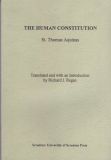用户登陆搜 索 |
查看图书
图书目录:Preface
Note on the Text and Translation Introduction Biblical Abbreviations Other Abbreviations Works Cited by St. Thomas Authors Cited by St. Thomas ST I Q. 75: On Human Beings, Who Are Composite Spiritual and Material Substances, and First Concerning the Essence of the Soul A. 1. Is the Soul a Material Substance? A. 2. Is the Human Soul Something Subsistent? A. 3. Are the Souls of Irrational Animals Subsistent? A. 4. Is the Human Soul the Human Being? A. 5. Is the Human Soul Composed of Matter and Form? A. 6. Can the Human Soul Pass Away? Q. 76: On the Union of the Soul to the Body A. 1. Is the Source of Intellection United to the Body as the Body' s Form? A. 2. Does Multiplicity of Bodies Multiply the Source of Intellection? A. 3. Do Human Beings Have Other, Essentially Different Souls Besides the Intellectual Soul? A. 4. Is there any other Form in Human Beings Besides the Intellectual Soul? A. 5. Is the Intellectual Soul Suitably United to the Body? A. 8. Is the Whole Soul in Every Part of the Body? Q. 78: On the Powers of the Soul in Particular A. 1. Should We Distinguish Five Kinds of Powers of the Soul? A. 2. Do We Suitably Assign the Vegetative Parts of the Soul, Namely, Powers of Nutrition, Growth, and Generation? A. 3. Do We Suitably Distinguish the Five External Senses? A 4. Do We Suitably Distinguish the Internal Senses? Q. 79: On the Intellectual Powers of the Soul A. 1. Is the Intellect a Power of the Soul? A. 2. Is the Intellect a Passive Power? A. 3. Should We Posit an Active Intellect? A. 4. Is the Active Intellect Something Belonging to Our Soul? A. 6. Is there Memory in the Intellectual Part of the Soul? A. 8. Is Reason a Different Power from the Intellect? A. 12. Is Synderesis a Special Intellectual Power Distinct from the Others? A. 13. Is Conscience a Power? Q. 80: On the Appetitive Powers in General A. 1. Are Appetites Special Powers of the Soul? A. 2. Are Sense and Intellectual Appetites Different Powers? Q. 81: On Sensuality A. 1. Is Sensuality only Appetitive? A. 2. Do We Distinguish Sense Appetites into Distinct Irascible and Concupiscible Powers? A. 3. Do the Irascible and Concupiscible Powers Obey Reason? Q. 82: On the Will A. 1. Does the Will Desire Anything Necessarily? A. 2. Does the Will Will Necessarily Everything that It Wills? A. 3. Is the Will a Higher Power than the Intellect? A. 4. Does the Will Move the Intellect? Q. 83: On Free Choice A. 1. Do Human Beings Have Free Choice? A. 2. Is Free Choice a Power? A. 3. Is Free Choice an Appetitive Power? Q. 84: How the Soul, While United to the Body, Understands Material Things Inferior to Itself A. 1. Does the Soul Know Material Substances Intellectually'? A. 2. Does the Soul Know Material Things by Reason of Its Essence? A. 3. Does the Soul Understand Every Kind of Thing by Forms Implanted in It by Nature? A. 4. Do Intelligible Forms Flow into the Soul from Certain Separate Forms? A. 5. Does the Intellectual Soul Know Material Things in the Eternal Natures of Things? A. 6. Do We Obtain Intellectual Knowledge from Sensibly Perceptible Things? A. 7. Can the Intellect Without Recourse to Sense Images Actually Understand by Means of Intelligible Forms in Its Possession? A. 8. Does Restraint of the Senses Prevent the Intellect's Judgment? Q. 85: On the Ways and Order of Understanding A. 1. Does Our Intellect Understand Corporeal and Material Things by Abstracting from Sense Images? A. 2. Are the Intelligible Forms Abstracted from Sense Images Related to Our Intellect as the Things It Understands'? A. 3. Are More Universal Things the First Things W'e Know Intellectually? A. 4. Can We Understand Many Things at the Same Time? A. 5. Does Our Intellect Understand by Composing and Dividing? A. 6. Can the Intellect Be False? A. 7. Can One Person Understand the Very Same Thing Better than Another Person Can? Q. 86: What Our Intellect Knows in the Case of Material Things A. 1. Does Our Intellect Know Individual Things? A. 2. Can Our Intellect Know Unlimited Things? A. 3. Does Our Intellect Know Contingent Things? A. 4. Does Our Intellect Know Future Things? Q. 87: How the Intellectual Soul Knows Itself and the Things Existing_ in Itself A. 1. Does the Intellectual Soul Know Itself by Means of Its Essence? A. 2. Does Our Intellect Know the Characteristic Dispositions of the Soul by Their Essences? A. 3. Does the Intellect Know Its Own Acts? A. 4. Does the Intellect Understand Acts of the Will? Q. 88: How the Soul Knows Things Superior to Itself A. 1. Can the Human Soul in the Condition of Our Present Life Understand Immaterial Substances Precisely as Such? A. 2. Can Our Intellect by Its Knowledge of Material Things Come to Understand Immaterial Substances? A. 3. Is God the First Thing that the Human Mind Knows? Q. 90: On the First Production of Human Beings Regarding the Soul A. 1. Is the Soul Made, or Is It part of God's Substance? A. 2. Does Creation Bring the Soul into Existence.'? A. 3. Does God Directly Produce the Rational Soul? A. 4. Was the Human Soul Produced Before the Body? Q. 91: On the Production of the Body of the First Human Being A. 2. Did God Directly Produce the Human Body? Q. 118: On the Transmission of Human Beings by Human Beings, Regarding the Soul A. 2. Does Semen Produce the Intellectual Soul? A. 3. Were Human Souls Created Together at the Beginning of the World? Glossary Select Bibliography Index |

